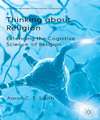Atheistic Platonism: A Manifesto: Palgrave Frontiers in Philosophy of Religion
Autor Eric Charles Steinharten Limba Engleză Paperback – 2 dec 2023
| Toate formatele și edițiile | Preț | Express |
|---|---|---|
| Paperback (1) | 781.45 lei 6-8 săpt. | |
| Springer International Publishing – 2 dec 2023 | 781.45 lei 6-8 săpt. | |
| Hardback (1) | 786.66 lei 6-8 săpt. | |
| Springer International Publishing – dec 2022 | 786.66 lei 6-8 săpt. |
Din seria Palgrave Frontiers in Philosophy of Religion
- 20%
 Preț: 691.33 lei
Preț: 691.33 lei - 15%
 Preț: 522.56 lei
Preț: 522.56 lei - 18%
 Preț: 727.18 lei
Preț: 727.18 lei -
 Preț: 391.61 lei
Preț: 391.61 lei - 18%
 Preț: 725.43 lei
Preț: 725.43 lei -
 Preț: 380.07 lei
Preț: 380.07 lei -
 Preț: 350.12 lei
Preț: 350.12 lei -
 Preț: 391.61 lei
Preț: 391.61 lei - 15%
 Preț: 641.53 lei
Preț: 641.53 lei - 18%
 Preț: 727.18 lei
Preț: 727.18 lei -
 Preț: 386.99 lei
Preț: 386.99 lei - 15%
 Preț: 634.82 lei
Preț: 634.82 lei -
 Preț: 263.45 lei
Preț: 263.45 lei -
 Preț: 357.63 lei
Preț: 357.63 lei -
 Preț: 386.81 lei
Preț: 386.81 lei - 18%
 Preț: 786.66 lei
Preț: 786.66 lei -
 Preț: 452.03 lei
Preț: 452.03 lei -
 Preț: 387.75 lei
Preț: 387.75 lei -
 Preț: 381.98 lei
Preț: 381.98 lei -
 Preț: 382.18 lei
Preț: 382.18 lei -
 Preț: 386.81 lei
Preț: 386.81 lei - 18%
 Preț: 789.20 lei
Preț: 789.20 lei - 15%
 Preț: 524.88 lei
Preț: 524.88 lei -
 Preț: 482.17 lei
Preț: 482.17 lei - 15%
 Preț: 529.92 lei
Preț: 529.92 lei - 18%
 Preț: 787.61 lei
Preț: 787.61 lei - 18%
 Preț: 722.12 lei
Preț: 722.12 lei -
 Preț: 387.96 lei
Preț: 387.96 lei -
 Preț: 393.52 lei
Preț: 393.52 lei - 18%
 Preț: 1122.42 lei
Preț: 1122.42 lei -
 Preț: 391.61 lei
Preț: 391.61 lei
Preț: 781.45 lei
Preț vechi: 952.99 lei
-18% Nou
Puncte Express: 1172
Preț estimativ în valută:
149.55€ • 162.39$ • 125.62£
149.55€ • 162.39$ • 125.62£
Carte tipărită la comandă
Livrare economică 22 aprilie-06 mai
Preluare comenzi: 021 569.72.76
Specificații
ISBN-13: 9783031177545
ISBN-10: 3031177541
Pagini: 343
Ilustrații: IX, 343 p. 10 illus.
Dimensiuni: 148 x 210 mm
Greutate: 0.43 kg
Ediția:1st ed. 2023
Editura: Springer International Publishing
Colecția Palgrave Macmillan
Seria Palgrave Frontiers in Philosophy of Religion
Locul publicării:Cham, Switzerland
ISBN-10: 3031177541
Pagini: 343
Ilustrații: IX, 343 p. 10 illus.
Dimensiuni: 148 x 210 mm
Greutate: 0.43 kg
Ediția:1st ed. 2023
Editura: Springer International Publishing
Colecția Palgrave Macmillan
Seria Palgrave Frontiers in Philosophy of Religion
Locul publicării:Cham, Switzerland
Cuprins
Chapter 1: Renewing Atheism.- Chapter 2: Starting at the Bottom.- Chapter 3: The One Emanates the Forms.- Chapter 4: The Cosmic Forms.- Chapter 5: The World Tree.- Chapter 6: The Emergence of Value.- Chapter 7: Emergence of Life.- Chapter 8: Platonism as a Way of Life.- Chapter 9: Multiverse Rebirth.- Chapter 10: To Call the World Tree.- Chapter 11: Atheistic Mysticism.
Notă biografică
Eric Charles Steinhart is Professor of Philosophy at William Paterson University. Among many articles and books, he has authored Your Digital Afterlives: Computational Theories of Life after Death and Believing in Dawkins: The New Spiritual Atheism.
Textul de pe ultima copertă
Atheistic Platonism is an alternative to both theism and nihilistic atheism. It shows how any jobs allegedly done by God are better done by impersonal Platonic objects. Without Platonic objects, atheism degenerates into an illogical nihilism. Atheistic Platonism instead provides reality with foundations that are eternal, necessary, rational, beautiful, and utterly mindless. It argues for a plenitude of mathematical objects, and an infinite plurality of possible universes. It provides mindless rational grounds for objective values, and for objective moral laws for the persons who evolve in universes. It defines a meaningful way of life, which facilitates self-improvement. Atheistic Platonists argue for computational theories of life after death. Atheistic Platonism includes a rich system of spiritual symbols. It values transformational practices and ecstatic experiences. Where atheisms based on materialism fail, atheisms based on Platonism succeed.
Eric Charles Steinhart is Professor of Philosophy at William Paterson University. Among many articles and books, he has authored Your Digital Afterlives: Computational Theories of Life after Death and Believing in Dawkins: The New Spiritual Atheism.
Caracteristici
Argues that an atheistic metaphysics based on Platonism succeeds where both theism and materialism fail Shows how Platonism helps atheists account for value, meaning, purpose, morality, and life after death Uses Platonism to define a positive atheistic way of life with a rich system of spiritual symbols and practices
